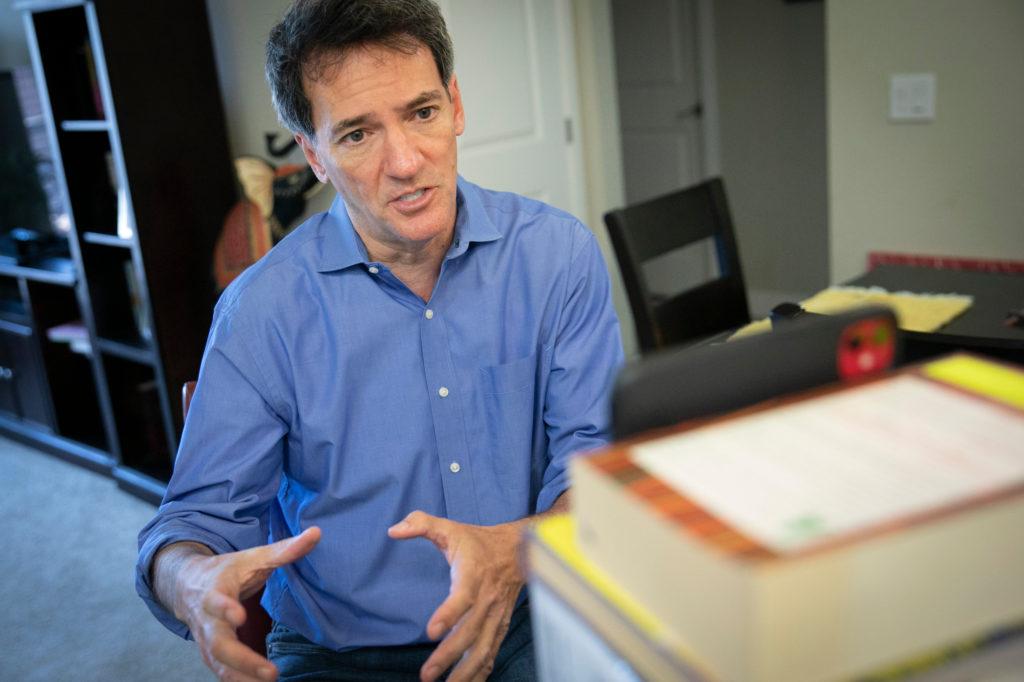
Colorado voters, check your mailboxes: ballots for the primary election have started to arrive.
The highest-profile race is the Democratic Senate contest between former House Speaker Andrew Romanoff and former Gov. John Hickenlooper. The two men were the only ones to qualify for the ballot out of an originally crowded and diverse field of contenders.
They’re vying to take on incumbent Republican Sen. Cory Gardner in November.
Andrew Romanoff, from ‘House Eagle Scout’ to party insurgent
Romanoff, 53, started his political career 20 years ago in the state House of Representatives, where he was seen as a rising star with a knack for navigating the state’s bipartisan politics. Today, he’s running as a progressive political outsider against the more centrist Hickenlooper.
Romanoff represented east Denver and Glendale for eight years, including three as Speaker of the House. He was known to some as the “House Eagle Scout,” as The Denver Post reported — an idealistic policy wonk who still doesn’t touch caffeine or alcohol. He led the Democrats’ first majority in the House since 1975.
Here’s how he described his political philosophy to the Post in 2008: “This is what tears me up, literally. There are little kids who are bright and talented and full of promise, and they might not be able to fulfill that potential because of the luck of the draw. It seems cruel and random. It seems like our job is to reduce the role of luck or love or fate.”

Among his accomplishments from his time in the legislature: Ref. C, the successful 2005 effort to loosen up TABOR restrictions on state revenues. Romanoff helped gather a bipartisan coalition behind the measure, including many influential Republicans. A few years later, he spearheaded the Building Excellent Schools Today Act, which has put more than $1 billion toward school construction and repair.
He’s also remembered for a compromise he made at that time.
Under his leadership, the Democratic legislature passed a 2006 immigration law that was commonly referred to as one of the “toughest” in the country. It was the product of a deal with then-Gov. Bill Owens, a Republican, and was meant to appease an anti-immigrant political movement that had swept the country since California’s Proposition 187 and prevent more draconian measures from coming forward.
The law, known as Senate Bill 90, required adults to prove they were in the country legally before they received state services and mandated that employers check immigration status. The policy largely mirrored existing federal law, but it also ensured that the state couldn’t offer in-state tuition to undocumented immigrants.
It was later repealed in 2013.
At the time, Romanoff called it a “practical, thoughtful and humane” implementation of existing laws, according to High Country News. The law was expected to have a relatively small effect in practice, since the state already denied most of those benefits to undocumented people, as columnist Jim Spencer wrote at the time. A year later, The Denver Post reported that state agencies had done little to enforce the law.
Some advocates for immigrants still criticize Romanoff for the law, which he said he’s “regretted ever since.” As he wrote recently: “Although we staved off the worst of the opposition’s efforts here in Colorado in 2006, I’m sorry we engaged in negotiations at all. When the other side shares no genuine interest in progress, negotiations are pointless.”
In 2010, Romanoff started a battle within the party by challenging Michael Bennet in the U.S. Senate primary, a year after Democratic Gov. Bill Ritter appointed Bennet to the seat. By entering the race, Romanoff was seen as taking on the party establishment, with support from hardcore Democrats around the state. Romanoff sold his house to finance the unsuccessful run, losing by nearly 10 points.
The same dynamic plays out today: Romanoff, a former “golden boy,” has positioned himself as the party insurgent against the preferred choice of the Democratic Senate Campaign Committee. He has the support of the party faithful who show up at caucus meetings, but Hickenlooper enjoys much broader name recognition.
Romanoff has dug in deeper than ever on progressive values in this race. Among other priorities, he calls for:
- A ban on hydraulic fracturing and a ban on oil extraction from public lands
- Medicare for All
- Affordable post-secondary education and a higher minimum wage
- Restrictions on gun sales
Romanoff spent his years between political runs working for nonprofits. He worked from 2010 to 2013 at the nonprofit International Development Enterprises. Following an unsuccessful 2014 Congressional campaign against Republican incumbent Mike Coffman, and after the death by suicide of a close cousin, Romanoff became president and CEO of Mental Health Colorado, a position he held until resigning to launch his gubernatorial run.
Romanoff grew up in Columbus, Ohio. He earned his bachelor’s from Yale University, and later a master’s in public policy from Harvard University and a law degree from the University of Denver. As a young man, he taught English in rural Costa Rica and Nicaragua. He currently lives in Aurora.
John Hickenlooper, lots of name recognition, and lots of history
After 16 years of high-profile political offices, 68-year-old John Hickenlooper is one of Colorado’s most well-known politicians: the two-term mayor of Denver, two terms as governor, five months in the presidential race and now a bid for the U.S. Senate.
The laid-off-geologist-turned-brewpub owner made his transition to politics in the crowded 2003 Denver mayoral race, running a positive campaign in spite of his underdog status. During his time as mayor, Hickenlooper helped bring the 2008 Democratic National Convention to Denver, raising both the city’s and his own national profile.

Hickenlooper jumped into the 2010 governor’s race after Democratic Gov. Bill Ritter unexpectedly decided not to run for a second term. The state was in the depths of the Great Recession and Hickenlooper’s first years in office were spent cutting budgets: slashing education spending, as well as closing a prison and a handful of state parks to make the numbers add up.
By the time Hickenlooper ended his tenure, in 2018, Colorado had fully enjoyed the post-Recession recovery. The population had boomed and the state had one of the lowest unemployment rates in the country.
Hickenlooper was known for taking a hands-off approach with the state legislature but occasionally did step into a central role. In 2012, after unsuccessfully trying to broker a compromise between Republicans and Democrats on a bill to allow civil unions, Hickenlooper brought lawmakers back for a special session to try to pass it again.
“I spent a long time in the restaurant business, and a lot of people that helped us create that business didn’t have the same rights as everybody else,” Hickenlooper said as he urged the measure’s passage.
It failed again but helped set up Democrats to take back the House in the fall.
The following session, in 2013, was a pivotal moment in Hickenlooper’s governorship. He helped negotiate passage of a slate of gun control bills inspired by the violence in Aurora and Sandy Hook, Connecticut, but frustrated some by doing little to advocate publicly for them through the process.

Hickenlooper’s focus on compromise also put him at odds with the rising anti-fracking movement in Colorado. At a time when local governments passed bans on the extraction technique, Hickenlooper argued the state had to respect private property rights. He worked with the oil and gas industry on reforms, like methane capture rules, while keeping more extreme anti-oil and gas measures off the ballot.
Marijuana legalization also happened under his watch, and he was slower to get on board with the idea than many members of his party. During his final year as governor, Hickenlooper vetoed a bipartisan bill to set up marijuana tasting rooms. He also vetoed measures to add autism to the list of conditions allowed for medical marijuana and to let publicly traded companies invest in the industry. He now says he supports decriminalization and the States Act.
Throughout his final years as governor, Hickenlooper’s presidential ambitions were a universal source of speculation in the halls of the state Capitol. Three months after he left office, in March of 2019, he made it official.
However, his moderate, Western persona failed to catch on in the crowded Democratic field. Hickenlooper pitched himself as a pragmatist, warning against any embrace of socialism by the party, as well as the expensive promises of Medicare For All and the Green New Deal.
“Certainly the vast majority of the problem with the campaign was me not being as good of a messenger as I need to be, but you can’t switch or trade-in a new candidate,” Hickenlooper told the Denver Post, reflecting on his presidential run.
As his campaign faltered, pressure began to ramp up for Hickenlooper to switch his attentions to the Senate race. It was an idea the former governor had dismissed even before joining the presidential race, telling Politico, “I’m not cut out to be a senator.”
Senate Minority Leader Chuck Schumer was instrumental in convincing Hickenlooper to reverse that position. Gardner's seat is considered a must-win if Democrats hope to flip control of the Senate and national Democrats quickly lept in to support Hickenlooper, frustrating his opponents.
Getting in the race, Hickenlooper had to address his past assertions that he wasn’t interested in the job, saying in a campaign video, "I've always said Washington was a lousy place for a guy like me who wants to get things done. But this is no time to walk away from the table.”
Recently, Hickenlooper has had to deal with an ethics investigation into travel he took as governor. Colorado’s Independent Ethics Commission found that he broke the rules on two different occasions, but cleared him in other incidents.
Tune in on June 16 to Colorado Public Radio’s 90-minute debate between Hickenlooper and Romanoff, also hosted by the Denver Post and Channel 7.









